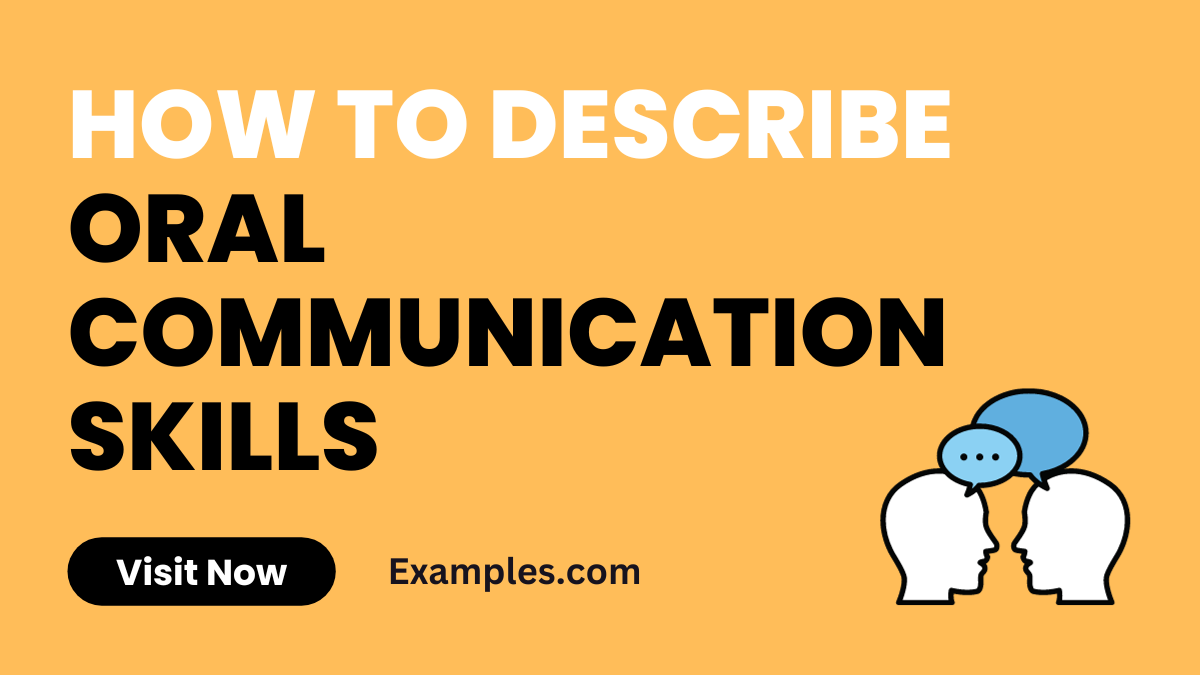How to Describe Oral Communication Skills?
Oral communication skills are vital in every aspect of life, from professional settings to personal interactions. This comprehensive guide delves into the nuances of these skills, offering practical insights and Oral Communication Examples. Learn to articulate thoughts clearly, engage in active listening, and effectively convey messages. Whether it’s a formal presentation or an informal chat, mastering these skills can significantly enhance your interactions and boost your confidence in various scenarios.
How Would You Describe Your Oral Communication Skills?

Describing oral communication skills involves evaluating how well you express yourself verbally and how effectively you listen to others. It’s about how clearly and confidently you speak, your ability to engage listeners, and your skill in conveying your message without misunderstandings. It also includes being an active listener, showing understanding, and responding appropriately. Essentially, it’s a blend of speaking and listening abilities that enable productive and clear communication in various situations, from casual conversations to formal presentations.
10 Describe Oral Communication Skills Examples
Oral communication skills are an amalgamation of speaking and listening abilities used in daily interactions. Excelling in these skills means effectively sharing ideas, understanding others, and creating meaningful dialogue. Here are 10 unique examples showcasing various aspects of oral communication, incorporating related keywords like Oral Communication in the Workplace and Effective Oral Communication Skills:
1. Leading a Team Meeting: I clearly outlined the agenda and encouraged team input, ensuring everyone’s ideas were heard and considered.
Example: “Let’s focus on today’s objectives. I’m eager to hear your thoughts and suggestions.”
2. Resolving Conflicts: I mediated a disagreement by listening to both sides and proposing a mutually beneficial solution.
Example: “I understand both perspectives. Let’s find a common ground that works for everyone.”
3. Delivering a Presentation: I used a confident tone and clear language to convey my message, making sure to engage the audience.
Example: “Today, I’m excited to share our new project, which I believe has great potential.”
4. Networking Events: I introduced myself and engaged in meaningful conversations, making connections with others in my field.
Example: “Hi, I’m [Your Name], and I’m passionate about [Your Field]. What brings you to this event?”
5. Customer Service Interaction: I addressed customer concerns with empathy and provided clear, helpful solutions.
Example: “I understand your issue and will do everything I can to resolve it quickly.”
6. Negotiating a Deal: I presented my points persuasively, focusing on mutual benefits to reach an agreement.
Example: “Let’s find a solution that benefits both our companies.”
7. Teaching a Class: I explained complex concepts in simple terms, ensuring students’ understanding and engagement.
Example: “Think of this concept as [Simplified Explanation], which makes it easier to grasp.”
8. Giving Feedback: I offered constructive feedback in a supportive manner, focusing on improvement and encouragement.
Example: “You’ve done well with this, but let’s work on enhancing your skills in…”
9. Participating in a Group Discussion: I listened attentively, contributed relevant points, and acknowledged others’ viewpoints.
Example: “I appreciate your perspective. Here’s another aspect to consider…”
10. Conducting an Interview: I asked open-ended questions and listened carefully, creating a comfortable atmosphere for the candidate.
Example: “Tell me about a challenge you faced and how you overcame it.”
Each of these examples demonstrates how Effective Oral Communication Skills play a crucial role in various scenarios, including Oral Communication in the Workplace, highlighting the importance of clear expression and active listening.
How to Describe Oral Communication Skills in Writing
When describing oral communication skills in writing, it’s crucial to articulate the ability to convey ideas clearly and effectively through speech. This involves mentioning how you articulate thoughts, manage tone, and use body language to complement verbal messages. Include examples like presenting ideas in meetings or having constructive conversations with colleagues. Emphasize your proficiency in Active Listening in Oral Communication and Feedback in Oral Communication. This showcases not just your speaking skills but also your ability to engage with others’ ideas.
How to Describe Good Oral Communication Skills

Good oral communication skills are characterized by clarity, conciseness, and the ability to tailor messages to different audiences. In describing these skills, focus on your proficiency in clear articulation, maintaining engaging eye contact, and using positive body language. Highlight instances where your communication had a significant impact, such as successfully leading a project or resolving workplace conflicts. Incorporating keywords like Oral Communication in Business and Strong Oral Communication Skills can help to contextualize your abilities in various professional scenarios.
How would you Describe Effective Oral Communication Skills?
Effective oral communication skills combine speaking clarity with active listening and adaptability. Describe your ability to speak confidently in various settings, be it in team meetings, client negotiations, or networking events. Emphasize skills like Speak Confidently in Oral Communication and Tailoring Messages to Different Audiences. Mention your approach to understanding and addressing the needs of your audience, ensuring that your communication is not just heard but also understood and acted upon. This reflects a comprehensive understanding of Effective Oral Communication Skills and their application in diverse situations.
In conclusion, effectively describing oral communication skills involves articulating your ability to speak clearly, listen actively, and adapt to your audience. Whether in writing or practice, these skills are pivotal in various settings. This guide provides essential insights and tips to help you convey your oral communication abilities confidently and effectively, enhancing both personal and professional interactions.



